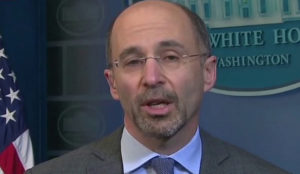The Once and Future ‘Clear-Eyed Expert’ Robert Malley

BY HUGH FITZGERALD
SEE: https://www.jihadwatch.org/2021/01/the-once-and-future-clear-eyed-expert-robert-malley;
republished below in full unedited for informational, educational & research purposes:
The Biden Administration has now appointed the anti-Israel and pro-Islamic Republic Robert Malley as America’s Special Envoy For Iran. It’s quite a choice. According to CNN,
State Department spokesperson Ned Price said that on Iran, Secretary of State Antony Blinken “is building a dedicated team, drawing from clear-eyed experts with a diversity of views. Leading that team as our Special Envoy for Iran will be Rob Malley, who brings to the position a track record of success negotiating constraints on Iran’s nuclear program. The Secretary is confident he and his team will be able to do that once again.”
So Malley is a “clear-eyed expert” who helped craft the 2015 Iran deal, which, we are told, constitutes part of his “track record of success”? Many would beg to differ, including Israeli Prime Minister Benjamin Netanyahu, who described that deal as “disastrous” and is fighting to keep it from being resurrected as written. Let’s not forget that the 2015 deal contained a sunset provision allowing Iran to acquire nuclear weapons after 15 years. But there is so much else that is wrong with the deal. Robert Satloff of the Washington Institute has provided a list of the most dangerous aspects of the 2015 deal here.
When will inspectors get into suspect sites? According to my [Satloff’s] read of the agreement, Iran has a total of 24 days to delay any set of inspections. While it may take more than 24 days to scrub clean a massive underground enrichment facility, there is a lot of illicit activity that Iran can hide with 24 days notice.
What are the consequences for Iranian violations?According to my read of the agreement, there is only one penalty for any infraction, big or small — taking Iran to the UN Security Council for the “snapback” of international sanctions. That is like saying that for any crime — whether a misdemeanor or a felony — the punishment is the death penalty. In the real world, that means there will be no punishments for anything less than a capital crime.
What does “snapback” mean in practice? Let’s say that the UN Security Council does order the reimposition of sanctions. According to my read of the agreement, all contracts signed by Iran up until that point are grandfathered in and immune from sanctions. That means one can expect a stampede of state-to-state and private sector contracts — some real, many hypothetical — all designed to shield Iran from the impact of possible reimposition of sanctions, thereby weakening the impact of the punishment.
But the problem with snapback gets worse. The agreement includes a statement that Iran considers a reimposition of sanctions as freeing it from all commitments and restrictions under the deal. In other words, the violation would have to be really big for the Security Council to blow up the agreement and reimpose sanctions. That effectively gives Iran a free pass on all manner of small to mid-level violations.
These and other gaps are substantial. They deserve close scrutiny by lawmakers and clear answers from the Administration. But concerns about the agreement are much broader.
The Iran deal also includes a dramatic rollback of all “nuclear-related” sanctions — whether imposed by the United Nations, the European Union or the United States. This includes all energy, financial, transportation and trade sanctions. Indeed, the agreement includes page after page of names of people and companies whose assets will be “unfrozen.” In addition, sanctions relief includes, in year five, the lifting of the conventional arms embargo on Iran and, in year eight, the lifting of limits on delivery of ballistic missile components to Iran.
Moreover, there is a key commitment in the agreement that signatories are prohibited from “re-introducing or re-imposing the sanctions” and, later in the text, are banned from “imposing discriminatory regulatory and procedural requirements in lieu of the sanctions and restrictive measures covered by the [agreement].” Does this mean the U.S. has tied its hands on applying these sanctions against Iran for other nefarious activity, from terrorism to human rights violations? At the very least, it appears that the United States did not make clear enough its intent to preserve sanctions for these non-nuclear purposes. Indeed, Iran may believe it is the only country in the world against whom a long list of penalties can never be applied for any crime it may do. That will only invite the bad behavior we hope to prevent.
The Iran accord goes further. On top of refraining from penalizing Iran for bad behavior, the U.S. and its partners commit to assist Iran to develop in energy, finance, technology and trade. The idea that America and its allies will actually help Iran grow stronger in these areas will sound a discordant note around the Middle East, where the Tehran regime is viewed as the eminence grise behind Bashar Assad’s brutal suppression of his people, the Houthi rebellion against state authority in Yemen, the creeping expansion of radical Shiite influence in Iraq and the activities of some of the most extreme Palestinian terrorist groups.
In that vein, this agreement is truly historic….
I read over what Robert Satloff wrote about the 2015 deal with increasing alarm and fury. This is the agreement which Robert Malley helped so considerably to craft. This “clear-eyed expert” didn’t realize or didn’t care that Mohammad Javad Zarif was running rings around him and the other Americans. And in Tehran, now that they have heard that Malley is back as the Special Envoy for Iran, they can hardly believe their luck. I wonder if Malley will, this time around, as he renegotiates with Iran, keep steadily in mind the criticisms made in 2015 by Robert Satloff that I’ve posted just above. I doubt it.
Malley also was one of the Americans who participated in the negotiations in 2000 at Camp David, between Yassir Arafat and Ehud Barak. Those talks, as everyone knows, ended in failure because, not having been given everything he wanted, and unwilling to agree to a clause declaring an “end to the conflict,” Yassir Arafat simply walked away. Clinton blamed Arafat for the failure. So did Ehud Barak, who had offered almost 100% of the West Bank to Arafat. So did Dennis Ross, a long-time American peace negotiator. Indeed, all the Americans involved knew that Arafat was to blame except Robert Malley. He alone insisted It was Ehud Barak who bore much of the blame. Malley’s father, Simon Malley, was an Egyptian Jew who led Egypt’s Communist Party and was for decades a confidant of Yassir Arafat. Perhaps that helps explain his son’s stout defense of the terror leader.
Some may remember that Malley was dropped from a role in Obama’s 2008 campaign because of protests from the Jewish community about his private meetings with Hamas. Yes, while Hamas had long been officially declared a terror group by the American government, Robert Malley thought he would open his own channels of communication to the terror group. Once Obama was in office, Malley was back as a senior policy advisor to Obama, who sent him to Egypt and Syria to discuss Obama’s policies on the Middle East. Malley seems to have a soft spot for Middle Eastern dictators, especially if they are anti-American. In 2007 he wrote an article in the L.A. Times advocating peace negotiations between Syria and Israel. The position of both the Israeli and the American governments was that such talks were a waste of time; Syria would demand back the Golan Heights, Israel would refuse, having in 1981 annexed the Golan as essential to the country’s defense, and that would be the end of the matter.
Malley, that “clear-eyed expert,” said this was the time for such an agreement because Syria is “unlikely to sponsor militant groups, jeopardize its newfound status, destabilize the region or threaten nascent economic ties for the sake of ideological purity once an agreement has been reached.” Can he possibly have been talking about the monstrous regime of the Assad family? Under their rule, Syria had long been a supporter of both Hezbollah and Hamas. Are these not “militant groups”? Didn’t Syria help, through its support of Hezbollah, to “destabilize” Lebanon? And did Malley really think there would be any chance of Syria making a deal with Israel if it did not get back the Golan, whatever “economic ties” it might be offered? Can Malley have been so muddle-headed and confused as to think that the Syrians would dare to defy Iran, their only sure ally, in order to try to make peace with Israel? Tehran would never have allowed it. Of course, Malley insisted (one of the six impossible things before breakfast he wanted everyone to believe) Damascus couldn’t be expected to “cut ties with Hezbollah, break with Hamas or alienate Iran as the entry fare for peace negotiations,” but Jerusalem, on the other hand – according to Robert Malley – would still have been willing to enter into such negotiations with Syria.
Robert Malley lurches from one wrongheaded conclusion to another (Ehud Barak is to blame for the breakdown in negotiations at Camp David! Syria’s Bashar Assad wants peace! Iran can be trusted to keep its solemn commitments under the nuclear deal!!). He has no great love for Israel. He has often written articles with his friend Hussein Agha, a former advisor to Arafat.
According to Lori Leventhal, reacting in 2009 to the news that Obama had put Malley in charge of dealing with ISIS, “Malley is the kind of new-age negotiator who thinks there is no tyrant too awful to shun — unless, of course, you are talking about Israel — and is always eager to play up the ‘positive’ aspects of genocidal terrorist regimes as the justification for allowing them right there in the tent, seated next to you. … With a history of dissing Israel, snuggling up to Hamas, shielding Assad, and promoting the containment of a nuclear-armed Iran, is it any surprise that Malley is Obama’s choice to spearhead the U.S. response to ISIS?”
We need only tweak, so as to update, Leventhal’s original verdict on Malley. He hasn’t changed a bit: “With a history of dissing Israel, snuggling up to Hamas, shielding Assad” and helping to fashion the disastrous Iran nuclear deal in 2015, Robert Malley is not a bad choice to be Special Envoy on Iran for the Biden Administration. He is the very worst choice. And now we are stuck with him and his deep miscomprehension of the Middle East. In Tehran, they must be very very pleased.
